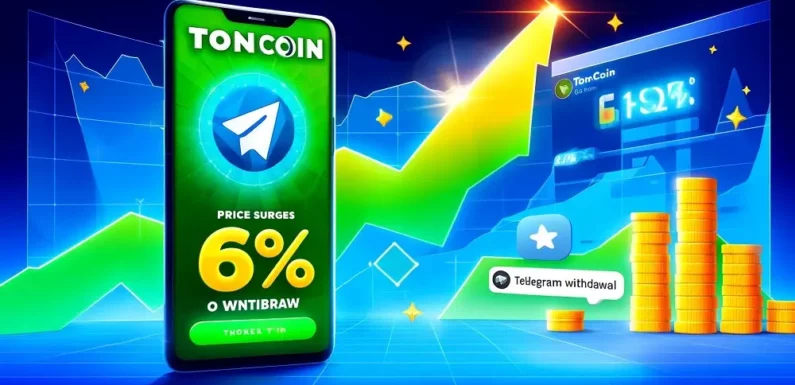
Toncoin Market Cap Reaches $13.96B
Toncoin, the native token of The Open Network (TON), has reached a market capitalization of $13.96 billion and surpassed 1.1 million daily active users. The achievement comes amidst turbulence following the arrest of Pavel Durov, CEO of Telegram.
He was detained on August 23 at Le Bourget airport near Paris. Durov faces multiple allegations, including involvement in illegal activities on Telegram, such as distributing child pornography, drug trafficking, and organized fraud.
TON Faces Challenges Amid Arrest News
Following news of Durov’s arrest, Toncoin’s value dropped by 25% on August 25, reaching $5.24. The impact of Durov’s arrest extends beyond Toncoin as the value of other tokens within the network also dropped significantly.
For instance, Notcoin (NOT), another leading token in the ecosystem, decreased by 18.1% over the past week. Similarly, the gaming platform GAMEE’s native currency (GMEE) fell by 31.5%, and the NFT game PunkCity’s governance cryptocurrency (PUNK) saw a 21.1% decrease.
Even the intentionally misspelled meme coin Povel Durev (DUREV), which was dedicated to Durov, declined by 8.4%. Additionally, The Open Network itself encountered issues as it halted new block production.
This disruption was due to an “abnormal load” on the network, which prevented several validators from clearing old transactions. During this period, the Dogs (DOGS) meme coin launch, which briefly achieved a $673 million market cap, added to the network’s traffic and complexity.
French President Denies Inviting Pavel Durov Amid Backlash
During his recent diplomatic visit to Serbia, French President Emmanuel Macron firmly denied any involvement in Telegram co-founder Pavel Durov’s arrest when he visited France. Macron stated that he was unaware of Durov’s presence in the country and emphasized that the French justice system would manage the case.
He made it clear that he did not know of the Telegram CEO’s arrival, adding that it was normal for him not to be informed of every foreign national’s visit. However, many saw Macron’s comments as an attempt to distance himself from the controversy.
Tech Community Reacts Strongly to Durov’s Detainment
The arrest of Pavel Durov has drawn strong reactions from global leaders, tech executives, and advocates for free speech. Many view the move as a dangerous precedent where there would be a crackdown on decentralized technology and the individuals behind it across the world.
Among the harshest critics of Durov’s arrest are prominent figures in the tech sector. Gabor Gurbacs, an ex-executive at VanEck, questioned the principles of the rule of law and freedom of expression.
Gabor’s remarks reflect a growing concern that the arrest is politically motivated, despite Macron’s denial. Mert Mumtaz, CEO of Helius Labs, added that there’s no way tech founders should be held responsible for the crimes committed on their platforms since there’s freedom of expression globally.
Fears of Broader Crackdown on Tech and Free Speech
The backlash has not been limited to the tech community. Durov’s arrest has sparked fears of increased regulation and potential restrictions on digital freedom across Europe. These concerns have prompted some in the tech industry to consider relocating their operations to more favorable environments.
Pavel Durov, now facing formal charges by French prosecutors, remains in France under strict conditions, including a €5 million bail bond. He is required to check in with law enforcement weekly and is barred from leaving the country.
Despite Macron’s assurances of the judiciary’s independence, the arrest has fueled speculation that France may be targeting leading figures in the decentralized tech space. The ongoing situation with Durov has further intensified debates on government interference in digital platforms and the broader implications for freedom of speech.
Meanwhile, Chris Pavlovski, CEO of Rumble, has reacted by moving his company out of Europe after alleged threats from French officials. His move suggests a growing concern among tech entrepreneurs about their safety and the future of their companies should they remain in Europe.



